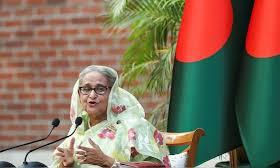
Bangladesh tribunal bans Sheikh Hasina’s "hate speech" broadcasts
text_fieldsBangladesh's International Crimes Tribunal (ICT) has prohibited the broadcast of former Prime Minister Sheikh Hasina's alleged "hate speech," citing concerns about its potential impact on legal proceedings and witness safety.
The ruling follows the tribunal's recent indictment of Hasina for alleged involvement in mass killings during the August revolution that led to her ouster.
Prosecutor Golam Monawar Hossain Tamim confirmed on Thursday that Sheikh Hasina faces multiple investigations, including charges of "mass murder" stemming from the violent suppression of protests during the revolution. Hundreds of lives were lost in police crackdowns and retaliatory killings, particularly targeting her Awami League supporters, in the aftermath of her removal from power.
The ICT argued that the dissemination of Hasina’s speeches could intimidate victims and witnesses, potentially obstructing justice. "If her speeches continue to circulate, it will become difficult to bring witnesses to the tribunal," Tamim said.
The tribunal’s decision comes days after Hasina addressed supporters in New York via videolink, accusing interim leader Muhammad Yunus of “mass murder.” Yunus, a Nobel Peace Prize laureate and head of Bangladesh’s interim government, has denied these allegations and committed to securing Hasina’s extradition from India to face trial.
Sheikh Hasina established the ICT in 2010 to investigate atrocities committed during Bangladesh’s 1971 war of independence. However, the court has faced criticism from human rights organizations for failing to meet international trial standards. The tribunal has been accused of being a political tool used by Hasina to suppress her rivals, with many opposition figures sentenced to death during her tenure.
It remains unclear which authority will oversee the enforcement of the broadcast ban or how it will determine what qualifies as "hate speech."























